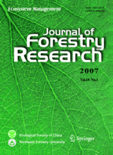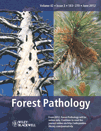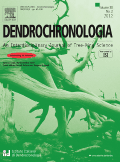
TREE PHYSIOLOGY
metrics 2024
Uncovering the Dynamics of Tree Growth and Health
Introduction
TREE PHYSIOLOGY, published by Oxford University Press, is a leading journal dedicated to the field of plant science and physiology, with a significant impact factor that highlights its importance in the academic community. Established in 1990, this journal has evolved to encompass a wide range of topics relating to the physiological processes of trees and woody plants, offering valuable insights to researchers and professionals alike. With its Q1 ranking in Plant Science and Q2 in Physiology for 2023, TREE PHYSIOLOGY is recognized for its high-quality, impactful research articles. Its Scopus rankings further emphasize its relevance, placing it in the top percentile within its categories, making it an essential resource for those involved in agricultural and biological sciences. Although it does not currently offer Open Access options, the journal remains committed to promoting the advancement of knowledge through rigorous peer review and scholarly excellence. Located in the United Kingdom, it serves an international audience, fostering collaboration and innovation in the study of tree physiology.
Metrics 2024
 0.99
0.99 3.50
3.50 4.10
4.10 147
147Metrics History
Rank 2024
Scopus
IF (Web Of Science)
JCI (Web Of Science)
Quartile History
Similar Journals

Comparative Biochemistry and Physiology D-Genomics & Proteomics
Transforming Knowledge: The Essential Journal for Genomic and Proteomic AdvancesComparative Biochemistry and Physiology D-Genomics & Proteomics, published by Elsevier Science Inc, is a premier journal in the realm of molecular biology and comparative physiology, with a focus on genomic and proteomic sciences. Recognized for its high-impact contributions, it holds a Q1 ranking in Animal Science and Zoology and was established with the vision of bridging gaps in our understanding of biological systems through experimental and comparative approaches. With an impressive Scopus ranking, this journal not only ranks among the top 12% in Animal Science and Zoology but also demonstrates commendable standings across various categories including Aquatic Science and Molecular Biology. The journal’s commitment to disseminating high-quality research makes it an essential resource for researchers, professionals, and students alike, allowing them to access critical studies that influence advancements in genomics and proteomics. While it operates under a traditional subscription model, its impactful findings are crucial for those aiming to enrich their knowledge and research capabilities in these pivotal scientific fields. Join us in exploring the transformative insights and developments that this esteemed journal has to offer for the study of genomics and proteomics.

Soil Ecology Letters
Elevating Understanding of Soil Functions and ImpactSoil Ecology Letters, published by SpringerNature, is a premier journal dedicated to advancing the knowledge and understanding of soil ecosystems, their functions, and their vital role in global sustainability. Since its inception in 2019, this leading journal has consistently maintained its prestigious Q1 ranking in Ecology, Evolution, Behavior and Systematics, as well as Soil Science, reflecting its significant impact in the ecological and environmental sciences community. With an impressive Scopus ranking that places it within the top percentile of journals in its field, Soil Ecology Letters provides a platform for researchers and professionals to disseminate their groundbreaking findings. The journal is a vital resource for advancing research in agricultural and biological sciences, offering open access options that promote widespread dissemination of knowledge. With its focus on fostering collaboration and innovation in soil ecology, this journal is essential reading for anyone aiming to deepen their understanding of soil environments and their critical role in ecological health.

JOURNAL OF PLANT RESEARCH
Nurturing Insights for a Greener Future.JOURNAL OF PLANT RESEARCH, published by SPRINGER JAPAN KK, is a leading academic journal that has carved a niche in the field of Plant Science. With its ISSN 0918-9440 and E-ISSN 1618-0860, this journal has been disseminating high-quality research since its inception in 1993 and continues to be essential reading for academics and practitioners alike, aiming to bridge the gap between innovative plant research and practical applications. The journal is highly regarded, holding a prestigious Q1 ranking in Plant Science for 2023, and is positioned in the top 80th percentile within the Scopus rankings for Agricultural and Biological Sciences. The journal's coverage includes a wealth of topics pertinent to advancing our understanding of plant biology, ecology, and sustainable agricultural practices. Although it operates under a subscription model, its influence in the research community remains profound, making it a vital resource for contemporary studies in plant-related disciplines.

BOSQUE
Advancing Sustainable Forestry KnowledgeBOSQUE, published by Universidad Austral de Chile, Facultad de Ciencias Forestales, stands as a pivotal platform for advancing the field of forestry and related environmental sciences. With an ISSN of 0717-9200, this journal has been committed to disseminating original research, reviews, and case studies essential for understanding forest ecosystems and management practices since its inception in 2006. As of 2023, it holds a Q3 ranking in the forestry category, showcasing a significant yet developing influence in the broader academic landscape, evidenced by its Scopus ranking placing it at the 12th percentile in Agricultural and Biological Sciences - Forestry. While boasting a diverse range of articles, BOSQUE promotes open access to a growing community of researchers, professionals, and students eager to contribute to sustainable forest management and conservation efforts. The journal continues to foster critical dialogue and innovation, making it an invaluable resource for those dedicated to enhancing forest sciences.

JOURNAL OF FORESTRY RESEARCH
Advancing forestry science for a sustainable future.JOURNAL OF FORESTRY RESEARCH, published by Northeast Forestry University in China, stands as a pivotal platform for advancing the field of forestry science. With an ISSN of 1007-662X and an E-ISSN of 1993-0607, this esteemed journal has maintained its commitment to disseminating high-quality research since its inception in 1997, converging into a recognized authority through the years. Currently boasting a Q1 ranking in the Forestry category for 2023, it ranks 18th out of 174 journals in its field on Scopus, highlighting its vital role in shaping contemporary forestry studies. The journal focuses on a broad spectrum of topics pertinent to forestry, including sustainable forest management, ecology, and conservation efforts, making it an indispensable resource for researchers, professionals, and students alike. Although it is not an open-access publication, the insights shared within its pages promise to contribute significantly to the advancement of knowledge and practices in forestry. The journal's significant impact and relevance are underscored by its operations from Harbin, People's Republic of China, where it continues to foster scholarly communication in the world of forestry research.

PHOTOSYNTHETICA
Transforming insights into impactful plant science.PHOTOSYNTHETICA is a prominent academic journal published by the Academy of Sciences of the Czech Republic, Institute of Experimental Botany, dedicated to advancing the field of plant science and physiology. Established in 1979, this open-access journal has been a vital platform for high-quality research and critical discussions within the scientific community, with its current impact factor reflecting its significance—ranking in the third quartile in Physiology and the second quartile in Plant Science as of 2023. With an impressive Scopus ranking (#96/516) in Plant Science and an 81st percentile standing, PHOTOSYNTHETICA showcases innovative research trends and methodologies vital for understanding photosynthetic processes and plant biology. The journal's open-access policy, initiated in 2019, ensures that valuable findings are readily available to researchers, professionals, and students globally, fostering collaboration and knowledge exchange. Set in the heart of Europe, this journal continues to be a cornerstone for experts dedicated to exploring the complexities of plant systems and their physiological responses.

FOREST PATHOLOGY
Enhancing Ecological Resilience Through Pathology InsightsFOREST PATHOLOGY is a premier journal published by Wiley that focuses on the intricate relationships between trees, pathogens, and forest health. With an ISSN of 1437-4781 and an E-ISSN of 1439-0329, this British journal has garnered an impressive reputation in the fields of Ecology and Forestry, achieving a Q2 Quartile ranking in both categories as of 2023. The journal invites researchers and professionals to explore cutting-edge studies and case reports that delve into forest pathology, contributing to the understanding of disease dynamics and management in forest ecosystems. Currently indexed in Scopus, it ranks 61st out of 174 in the Forestry category and 214th out of 461 in Ecology, reflecting its impact and relevance in advancing the field. Access options are available to cater to a wide audience, emphasizing the journal's commitment to disseminating vital knowledge that enhances forest management practices and ecological resilience. FOREST PATHOLOGY stands as an essential resource for those dedicated to the health and sustainability of forest ecosystems.

NEW FORESTS
Unlocking Insights in Forest Ecosystems.NEW FORESTS, published by SPRINGER, stands at the forefront of forestry research, delivering cutting-edge insights into forest science, management, and conservation. With an ISSN of 0169-4286 and an E-ISSN of 1573-5095, this esteemed journal has earned a distinguished reputation as it continues to contribute significantly to the field since its inception in 1986. As evidenced by its impressive ranking in the Q1 category for Forestry and being positioned at #32/174 in the Scopus Ranks for Agricultural and Biological Sciences, NEW FORESTS maintains an 81st percentile standing, emphasizing its influential role in advancing scientific discourse. The journal focuses on a diverse array of topics within the realm of forestry, making it an essential resource for researchers, professionals, and students eager to engage with contemporary developments and challenges in forest ecosystems. Although it is not an open-access journal, access to its articles can be facilitated through various academic institutions and libraries, ensuring that vital research is available to a broad audience. As we look toward the future, NEW FORESTS continues to strive for excellence, fostering dialogue and collaboration among scholars committed to sustainable forest management and restoration until at least 2024.

DENDROCHRONOLOGIA
Connecting Nature's History with Today's ChallengesDendrochronologia is a prestigious journal dedicated to the study of tree rings and their implications for understanding environmental changes, climate variability, and ecological dynamics. Published by Elsevier GmbH in Germany, it has consistently reached high academic standards, holding a remarkable Q1 ranking in both Ecology and Plant Science as of 2023, demonstrating its significant impact within these fields. The journal aims to foster interdisciplinary dialogue through the dissemination of original research, reviews, and methodological advancements related to dendrochronology, appealing to researchers, students, and professionals who seek to deepen their knowledge of the interactions between terrestrial ecosystems and climate change. Although it does not currently offer an open access option, Dendrochronologia remains an essential resource for those in the scientific community, with valuable insights that contribute to the understanding of biodiversity and ecological resilience.

Journal of Experimental Zoology Part A-Ecological and Integrative Physiology
Bridging disciplines to illuminate organismal biology.The Journal of Experimental Zoology Part A - Ecological and Integrative Physiology, published by WILEY, is a distinguished peer-reviewed journal focusing on ecological and evolutionary physiology, providing a robust platform for research that bridges both ecological and integrative physiological concepts. With an impressive impact factor and recognition as a Q1 journal in both Animal Science and Zoology and Ecology, Evolution, Behavior and Systematics in 2023, it positions itself as a leader in advancing our understanding of organismal biology and environmental interactions. The journal is committed to open access, offering researchers and professionals worldwide the opportunity to share and disseminate their findings freely. Since its inception in 2017, it has rapidly gained prominence—ranking within the top percentiles of Scopus Ranks across several disciplines, including genetics and molecular biology. This not only underscores its relevance but also highlights its vital role in facilitating interdisciplinary approaches essential for addressing contemporary biological challenges. Researchers, educators, and students alike will find in this journal a valuable resource for cutting-edge studies and innovative methodologies in the field.